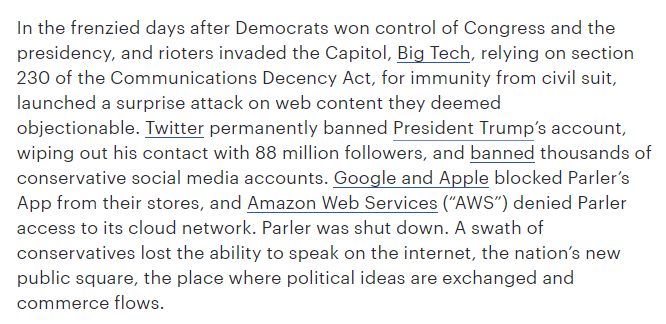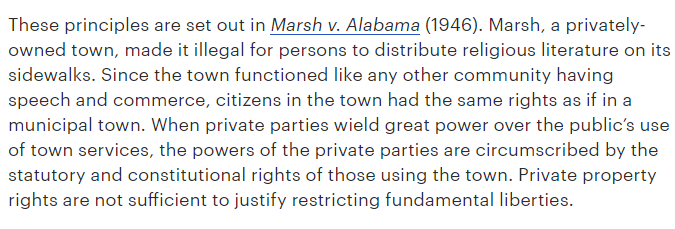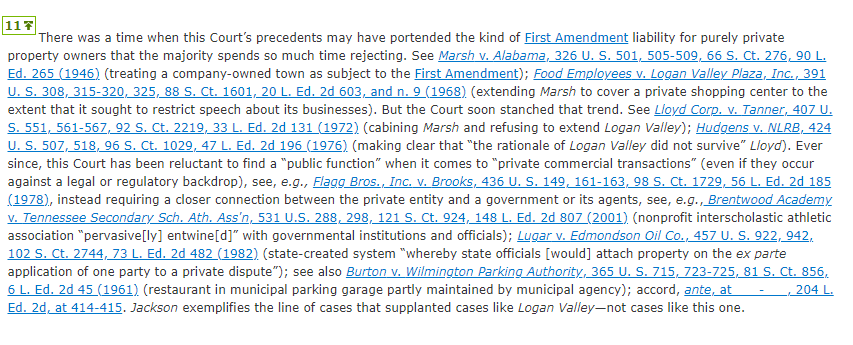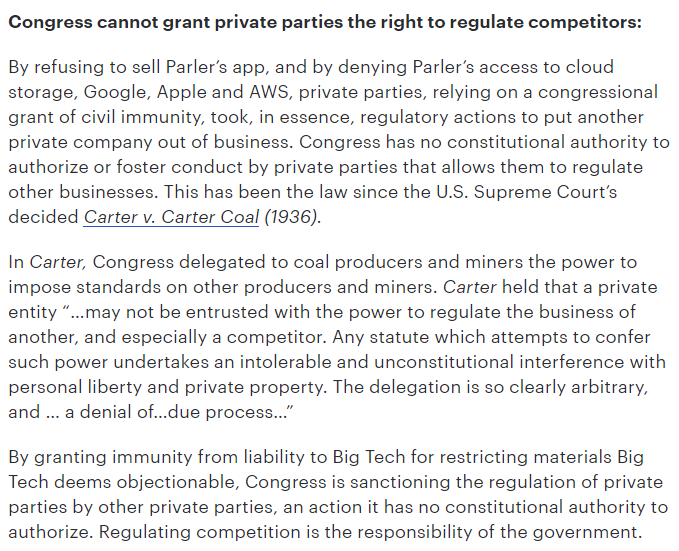1/ Another day, another #Section230 op-ed unmoored from fact and law. This one comes to you via @WilliamLKovacs and @TheHillOpinion. It is a tangle of the usual factual and legal misunderstandings, with a strange new one thrown in for good measure. https://thehill.com/opinion/technology/535497-section-230s-unconstitutional-delegation-of-power-to-big-tech
2/ Let's talk about this opening paragraph. First, it certainly was *not* a "sneak attack." Twitter has been quite clear that Trump ogot away with things that would get others banned because he was president. If you didn't see this coming, you just weren't paying attention.
3/ The Parler dispute was also not a "sneak attack," and to claim it is strikes me as dishonest. It was a direct response to developing events--you know, the *actual attack* on the Capitol.
4/ Further, it wasn't Section 230 that gave any of these companies the ability to do what they did. The things that gave them that power were a combination of the First Amendment and contract law, as I'll explain further below.
5/ The "new public square" phrase telegraphs the argument to follow, by co-opting language from First Amendment jurisprudence in a way that isn't particularly honest or coherent.
6/ He frames the piece thusly, and I suppose it makes sense that if you want to write a piece that makes nonsense arguments, you'd frame nonsense questions. The answer to both is no, because neither of those things have been done.
7/ You don't have free speech rights against Twitter, and Section 230 does not mean that tech companies can regulate competitors.
8/ This explanation is one that only someone who has never actually read Section 230 could love. Let's tackle the first provision: what the hell did Kovacs read? I've seen some weird interpretations but this one is particularly weird.
9/ What (c)(1) *actually* says is that users or providers of interactive computer services are not legally considered the publishers of material provided by others. This also immunizes against for suits attempting to impose liability for traditional editorial functions.
10/ In describing (c)(2), Kovacs accidentally gives up his game. 230(c)(2) does not only immunize "big tech," it also provides that immunity to...everyone else that qualifies for it. But I suppose this phrasing is useful for riling up the angry anti-"big tech" crowd.
11/ Here's where things get even worser. It is not Congress that authorized people to regulate speech on their own property via purely privately-imposed consequences. It is the First Amendment that authorizes that.
12/ And I can't believe I have to say this...but the First Amendment only restricts state actors. And that last sentence...just textbook question begging mixed in with vague and unsupportable legal conclusions. "tHe NeW pUbLIc SqUArE!!!!"
13/ Here we go again with Marsh... Kovacs' explanation of the case is inaccurate (Marsh didn't hold that "if you have speech and commerce, private actors are bound by the First Amendment." That would be nonsense.), and his conclusion relies solely on dicta.
14/ But even if that were not so, Kovacs conveniently forgets to mention that the Supreme Court has rejected that insanely broad reading of Marsh, most recently imn the Halleck decision.
15/ To transform tech companies into state actors, you have to prove that they perform a function traditionally and exclusively performed by the government. Clearly that isn't the case, and that's why this part is always suspiciously absent in the "what about Marsh!" articles.
16/ This is just ridiculous nonsense. Twitter is "functioning as a government?" In what universe?
It's hard to tell if this is a case of simple ignorance of how the First Amendment works, or rank disingenuity.
It's hard to tell if this is a case of simple ignorance of how the First Amendment works, or rank disingenuity.
17/ Never mind, it's just disingenuous; get a load of the pretzel twisting in this insane argument. No, Section 230 doesn't allow companies to regulate competitors. Parler and AWS had a contract. Parler breached it, so AWS cut them off. It's really not complicated.
18/ Even without Section 230, AWS couldn't be forced to carry content it doesn't want to. Saying that a company exercising its contractual and constitutional rights is akin to regulatory action is seriously unhinged, and confuses regulation with business decisions.
19/ The cite to Carter Coal makes absolutely no sense. AWS isn't "regulating" anything. It isn't telling Parler what it can do. It's telling Parler what it can't do *utilizing AWS's platform.* That's a big difference, and so obvious that it veers into dishonesty.
20/ And on top of that, again, AWS could do all this even without Section 230, because it still would have no legal obligation to do business with Parler. And I'd be super interested to learn how Kovacs thinks AWS competes with Parler...
21/ For its flagrant misrepresentation of what #Section230 is/does and First Amendment law, and for it's bizarre and dishonest claim that tech companies are "regulating" and therefore Section 230 is an unconstitutional delegation:
I award this article 4 out of 5 Ted Cruzs.
I award this article 4 out of 5 Ted Cruzs.
P.S./
If you're wondering why only 4/5 Ted Cruzs, it's because it did not cite the mythical publisher/platform distinction or say that Section 230 was premised on neutrality. I docked 0.5 Ted Cruzs for each of those omissions of non-reality.
But it tried.
If you're wondering why only 4/5 Ted Cruzs, it's because it did not cite the mythical publisher/platform distinction or say that Section 230 was premised on neutrality. I docked 0.5 Ted Cruzs for each of those omissions of non-reality.
But it tried.

 Read on Twitter
Read on Twitter










